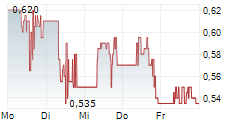VANCOUVER, BC / ACCESS Newswire / February 14, 2025 / Onco-Innovations Limited (CSE:ONCO)(Frankfurt:W1H,WKN: A3EKSZ) ("Onco" or the "Company") is pleased to provide information on its licensed nanoparticle formulation of a new class of Polynucleotide Kinase 3'-Phosphatase (PNKP) inhibitors (the "Technology" or "PNKP Compound"), which has shown effectiveness in slowing the growth of colorectal cancer (CRC) tumours when used as a standalone treatment and in combination with radiation therapy, based on findings from June1 and December2 2021 studies led by researchers at the University of Alberta. Onco-Innovations highlights three key aspects of the studies: the nanoparticle formulation of the PNKP compound's ability to target cancer site; the effectiveness of this formulation as a standalone treatment in mice with colorectal cancer; and its effectiveness when combined with radiation therapy.
Onco's Nanoparticle Formulation PNKP Technology as a Standalone Treatment
The June 2021 study showed that Onco's nanoparticle formulation of PNKP inhibitors effectively slowed the growth of cancer cells in colorectal cancer-bearing mice. The study reported an in vitro and in vivo evaluation of a nano-encapsulated (NP) potent lead PNKP inhibitor, the Technology, as a new targeted therapeutic for PTEN3-deficient CRC. Dose escalating toxicity studies in healthy CD-1 mice, based on measurement of animal weight changes and biochemical blood analysis, revealed the safety of both free and nano-encapsulated PNKP inhibitors, at assessed doses of =50 mg/kg. Nano-carriers of the PNKP inhibitors effectively inhibited the growth of HCT116/PTEN-/- xenografts in NIH-III nude mice following intravenous (IV) administration, but not that of wild-type HCT116/PTEN+/+ xenografts. The NP formulation seems to have resulted in increased levels of the drug delivered to tumour tissue. These data provide evidence for the success of NPs of our lead PNKP product, as novel synthetically lethal nano-therapeutics in the treatment of PTEN-deficient CRC4.
To this end, mice implanted with colorectal cancer tumours were treated with Onco's conventional or nanoparticle-based formulation of our lead PNKP inhibitor. Tumours had been introduced into the mice 12 days prior to the start of the experiment. Over the course of 22 days, mice were assigned to two distinct treatment groups, each receiving six injections: one group received placebo injections (5% dextrose), the other was treated with the nanoparticle-based PNKP inhibitor formulation.
Throughout the study, the researchers used advanced imaging techniques to closely monitor the tumours, conducting scans four times during the treatment period to assess tumour progression. The final results were compelling as the nanoparticle-based PNKP formulation significantly slowed the growth of PTEN-deficient tumours compared to the placebo group. PTEN is a tumour suppressor gene that plays a critical role in controlling cell growth. Tumours lacking PTEN often grow more aggressively and are more difficult to treat, making these findings particularly promising for patients with such mutations.
The outcome of this study further validated the potential of the PNKP Compound as a potent, single-agent therapy in combating colorectal cancer, specifically in cases where tumours exhibit PTEN deficiencies.
Onco's Nanoparticle Formulation PNKP Technology with Radiation
The December 2021 study showed that Onco's nanoparticle formulation of PNKP inhibitors, when combined with radiation therapy, significantly slowed the growth of colorectal cancer tumours in mice. Another objective of the study was to assess the therapeutic effect of conventional versus nano-formulations of Onco lead PNKP inhibitor for sensitization of wild type CRC models to radiation therapy, both in vitro and in vivo.
In this context, mice implanted with colorectal cancer tumours were treated with Onco's conventional or nanoparticle-based formulation of our lead PNKP inhibitor. Again, tumours had been introduced into the mice 12 days prior to the start of the experiment. Over the course of 24 days, mice assigned to three distinct treatment groups each received three injections of either empty nanoparticles alone, empty nanoparticles plus radiation, or nanoparticles of PNKP inhibitor plus radiation. Two different imaging techniques along with caliper measurement of tumour dimensions showed no tumour growth within the timeline of the study only in tumours treated with a combination of nanoparticles of PNKP inhibitor plus radiation. This study which was conducted on PTEN-positive CRC models shows the activity Onco's lead PNKP inhibitor formulation in sensitization of CRC to radiation.
About Onco's Nanoparticle Formulation PNKP Technology
Onco's innovative nanoparticle formulation of its PNKP technology uses nanoparticles to preferentially deliver the PNKP inhibitor directly to cancer cells, distinguishing it from traditional treatments that affect both healthy and cancerous cells. This targeted approach is believed to improve the drug's stability and precision, and to minimize impact on non-cancer cells. By doing so, Onco's Technology has been shown5 to reduce unwanted side effects on healthy cells and to enhance the drug's effectiveness. The use of nanoparticles also increases the drug's levels at the cancer site, meaning more of it can reach the target area, and improves its therapeutic index, which measures the balance between effectiveness and safety.6
In conclusion, one of the key differentiators of Onco's Technology is its ability to selectively target cancer while sparing healthy tissue. This precision in targeting makes it an especially promising therapeutic option, reducing the potential for harmful side effects often seen in traditional cancer treatments.7 By focusing its effects on cancer cells, Onco's Technology aims to not only enhance the efficacy of treatments, like radiation therapy, but to also ultimately improve patient safety and quality of life.
"The studies have shown that our nanoparticle PNKP Compound holds great potential as a key advancement toward cancer care and treatment, with the capacity, through further research and development, to possibly become a solution in areas where traditional therapies have fallen short. These studies have indicated that our formulation has the ability to selectively target cancer sites, and enhance the effects of radiation treatment. By enhancing the effectiveness of existing therapies like radiation, our Technology could offer new hope in the battle against cancer, while also positioning the Company at the forefront of oncology innovation," said Thomas O'Shaughnessy, CEO of the Company.
About Onco-Innovations Limited
Onco-Innovations is a Canadian-based company dedicated to cancer research and treatment, specializing in oncology. Onco's mission is to prevent and cure cancer through pioneering research and innovative solutions. The company has secured an exclusive worldwide license to patented technology that targets solid tumours, setting new standards in cancer treatment. Onco's commitment to excellence and innovation drives it to develop advanced therapies that improve patient outcomes and offer hope in the fight against cancer.
ON BEHALF OF ONCO-INNOVATIONS LIMITED,
"Thomas O'Shaughnessy"
Chief Executive Officer
For more information, please contact:
Thomas O'Shaughnessy
Chief Executive Officer
Tel: + 1 888 261 8055
investors@oncoinnovations.com
The CSE and Information Service Provider have not reviewed and do not accept responsibility for the accuracy or adequacy of this release.
Forward-Looking Statements Caution. This news release contains forward-looking statements relating to the further development, potential commercialization and benefits of the Technology, and the prospects of the Company, and the Company's business and plans generally, and other statements that are not historical facts. Forward-looking statements are often identified by terms such as "will", "may", "potential", "should", "anticipate", "expects" and similar expressions. All statements other than statements of historical fact, included in this release are forward-looking statements that involve risks and uncertainties. There can be no assurance that such statements will prove to be accurate and actual results and future events could differ materially from those anticipated in such statements. Important factors that could cause actual results to differ materially from the Company's expectations include the failure to further develop, prove out or commercialize the Technology, the failure to successfully complete further trials and studies, , the failure to receive regulatory approval in respect of the Technology, and other risks detailed from time to time in the filings made by the Company with securities regulators. The reader is cautioned that assumptions used in the preparation of any forward-looking information may prove to be incorrect. Events or circumstances may cause actual results to differ materially from those predicted, as a result of numerous known and unknown risks, uncertainties, and other factors, many of which are beyond the control of the Company. The reader is cautioned not to place undue reliance on any forward-looking information. Such information, although considered reasonable by management at the time of preparation, may prove to be incorrect and actual results may differ materially from those anticipated. Forward-looking statements contained in this news release are expressly qualified by this cautionary statement. The forward-looking statements contained in this news release are made as of the date of this news release and the Company will update or revise publicly any of the included forward-looking statements as expressly required by applicable law.
1 Sadat et al. A synthetically lethal nanomedicine delivering novel inhibitors of polynucleotide kinase 3'-phosphatase (PNKP) for targeted therapy of PTEN-deficient colorectal cancer. J Control Release. 2021 Jun 10;334:335-352. doi:10.1016/j.jconrel.2021.04.034
2 Sadat et al. Nano-Delivery of a Novel Inhibitor of Polynucleotide Kinase/Phosphatase (PNKP) for Targeted Sensitization of Colorectal Cancer to Radiation-Induced DNA Damage. Front Oncol. 2021 Dec 23;11:772920. doi: 10.3389/fonc.2021.772920
3 Phosphatase and TENsin homolog deleted on chromosome 10 (PTEN) is a major tumor-suppressor protein that is lost in up to 75% of aggressive colorectal cancers. The co-depletion of PTEN and a DNA repair protein, polynucleotide kinase 3'-phosphatase (PNKP), has been shown to lead to synthetic lethality in several cancer types including CRC.
4 https://www.sciencedirect.com/science/article/pii/S016836592100208X
5 https://www.frontiersin.org/journals/oncology/articles/10.3389/fonc.2021.772920/full
6 https://www.frontiersin.org/journals/oncology/articles/10.3389/fonc.2021.772920/full
7 "Cancer chemotherapy and beyond: Current status, drug candidates, associated risks and progress in targeted therapeutics" in Genes & Diseases, Volume 10, Issue 4, July 2023: pp. 1367-1401
SOURCE: Onco-Innovations Limited


